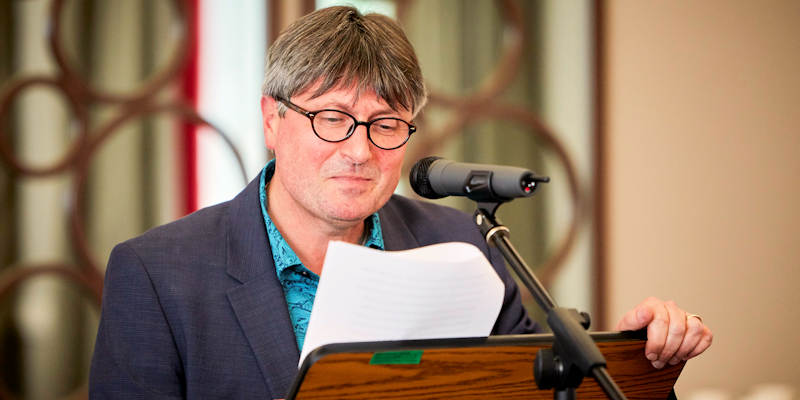Simon Armitage: My First Laureate Poem

Conquistadors
In this afterthought
he’s just turned six,
the astronaut in him
doing his damnedest to coincide
the moon landing
with his first kiss,
hoping to plant his lips
on ----- --------’s
distant face
as Simon Armstrong
steps from the module
onto Tranquillity Base.
But as Tricky Dicky clears his throat
to claim God’s estate
as man’s backyard
from the Oval Office,
and the gap narrows
to feet then inches,
suddenly stars recoil
to further dimensions
and heaven flinches.
If the role of the Poet Laureate is to write topical or occasional poems then I guess this is my first Poet Laureate poem. Not a commission, though, and not produced out of any kind of obligation, just a daydream that kept evolving and revolving until it crystallised into words. It’s an “afterthought” in the sense that I missed the fiftieth anniversary of the event it describes, plus all the attendant hullaballoo, by about a week. And an “afterthought” that exercises poetry’s right to think first and speak later rather than say the first thing that comes to mind, as dates and deadlines often require of us. The first interplanetary journey by any life-form in the entire universe, as far as we know, still seems like an extraordinary occurrence, and the fact that it happened in my lifetime rather than on any occasion in the infinity of time, past or future, is something I can barely process or meaningfully comprehend. But as captivating and momentous as the episode was, it didn’t excuse President Nixon’s scripted remark in a phone call from the White House, telling the astronauts, “Because of what you have done, the heaven’s have become part of man’s world.” Surely on both a geographical and a spiritual level, the further we penetrate into the distance, the further the distance deepens, darkens, extends. If ever there was a moment in history that called out for humility and grace rather than an arrogant boast, surely it was 20:17 UTC on the 20th July 1969, or six hours and thirty nine minutes later when Neil Armstrong put his foot on the moon.
As a six year old who wanted to be an astronaut, I don’t think I’d made the association between the moon as a satellite of the earth and the moon as a “Lozenge of love” as Larkin called it in Sad Steps, referencing Sir Philip Sidney’s “With how sad steps, O moon, thou climb’st the skies” (from his celestial sonnet sequence Astrophil and Stella). And I certainly knew nothing of Robert Graves’ view that penetrating the mother goddess with a phallic shaped rocket represented “the greatest crime against humanity in 2,000 years.” “All saints revile her, and all sober men/ruled by the God Apollo’s golden mean” his poem The White Goddess begins, a prayer of sorts to the matriarchal deity we turned our backs on in pursuit of macho adventures and in the worship of male Gods. But I probably did understand, at an instinctive level, the dangerous overlap between desire and possession, between wanting something exciting to happen and wanting to own that excitement. Romance as colonialism, love as conquest, playground passion and a juvenile crush played out at the planetary level, or vice versa. The omitted name is an invitation: insert your own letters. As for the form of the poem, that sliding tercet seems to be my go-to pattern at present, a natural accommodation of my phraseology, breath, speed of thought, speech patterns and reading style, though if anyone wants to believe that each verse is shaped as a little stepladder, down which a weightless astronaut in heavy boots might descend from the lunar landing craft to the moon’s surface, please be my guest.
